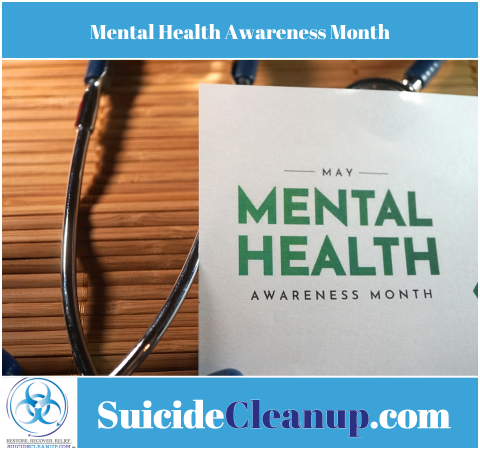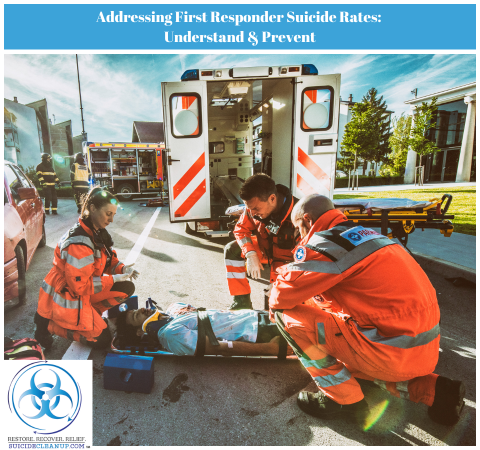
Love Island UK Suicides: Reality TV & Mental Health
September 3, 2024Guidelines for Handling Suicide Cleanup
October 2, 2024Physicians are often seen as the backbone of healthcare, tirelessly caring for others, yet the mental health challenges they face frequently go unnoticed. National Physician Suicide Awareness Day, observed annually on September 17th, shines a critical spotlight on the growing crisis of physician burnout, depression, and suicide. With healthcare professionals facing immense pressure, the day serves as a vital call to action—encouraging open dialogue, support, and systemic changes to prioritize the mental well-being of those who dedicate their lives to saving others. The time to address mental health in healthcare is now.
The Importance of National Physician Suicide Awareness Day
National Physician Suicide Awareness Day is dedicated to physician mental health and serves as a crucial platform for highlighting these challenges and promoting discussions about solutions. By acknowledging the realities of burnout and advocating for a culture that prioritizes mental health, we can help mitigate the risk of suicide among physicians—a tragic outcome that is all too common in this profession.
Support for doctors must encompass comprehensive strategies that address both individual and systemic factors contributing to stress and burnout. This includes creating environments where healthcare professionals feel safe discussing their struggles without fear of judgment or repercussions. By fostering a supportive atmosphere and encouraging open dialogue about mental health, we can work towards a healthier future for all healthcare providers.
The Statistics Behind Physician Suicide: A Critical Look
The issue of physician suicide rates has garnered increasing attention in recent years, highlighting a mental health crisis within the medical profession. Alarming trends in physician wellbeing show that healthcare providers are at a significantly higher risk for suicide compared to the general population. Here are some statistical insights from The American Foundation for Suicide Prevention:
- Every year in the U.S., approximately 300 to 400 doctors die by suicide.
- Female physicians in the U.S. are 250 to 400% more likely to die by suicide than women in other professions.
- While in the general population, men are four times more likely to complete suicide than women, female doctors have a suicide rate comparable to their male counterparts.
- Medical students experience depression at rates 15 to 30% higher than the general population, with depression being a major risk factor for suicide. Other contributing factors include bipolar disorder and substance abuse.
- Female physicians have a higher prevalence of major depression compared to women with doctoral degrees of the same age group.
- One reason for the elevated suicide rate among doctors is their higher completion-to-attempt ratio, which may be linked to their knowledge of drug lethality and easier access to lethal methods.
One of the key contributors to this crisis is physician burnout, which affects nearly 50% of healthcare professionals. The demanding nature of medical practice, long hours, and emotional exhaustion can lead to severe mental health issues among doctors. Risk factors for physicians include:
- High-stress environments
- Access to lethal means
- Stigma surrounding mental health issues
- Inadequate support systems within healthcare settings
Awareness campaigns and support systems tailored specifically for healthcare providers are essential steps toward mitigating these alarming trends and fostering a healthier work environment for those who dedicate their lives to caring for others.
Recognizing the Signs of Distress Among Physicians
Recognizing the signs of distress among physicians is crucial for maintaining not only their well-being but also the quality of care they provide to patients. Common physician stress indicators include:
- Chronic fatigue
- Decreased job satisfaction
- Irritability
- Anxiety
- Difficulty concentrating
By fostering an environment that encourages open dialogue about mental health and implementing support systems within healthcare settings, we can help identify these distress signals early on and promote a healthier workplace for all physicians.
Resources and Support Systems for Physicians
- National Suicide Prevention Lifeline, 1-800-273-TALK (8255)
- American Foundation for Suicide Prevention
- Black-Bile, a website for physicians with depression
- American Association of Suicidology
- Federation of State Physician Health Programs
The Role of Healthcare Institutions in Preventing Physician Suicide
The role of healthcare institutions in preventing physician suicide is crucial and multifaceted. Creating supportive environments for doctors begins with fostering a culture that prioritizes mental health. Institutions must implement robust policies that address mental health concerns, ensuring that support systems are in place for physicians who may be struggling. This includes developing institutional policies on mental health that encourage open dialogue and reduce stigma around seeking help.
Training programs for staff awareness are essential in fostering a culture of openness around mental health issues. By educating all healthcare personnel about the signs of burnout and depression, institutions can empower their teams to recognize when colleagues may be struggling and encourage them to seek help.
Promoting work-life balance in healthcare settings is another vital aspect. By advocating for reasonable working hours, manageable patient loads, and adequate time off, institutions not only enhance job satisfaction but also significantly reduce stress levels among physicians. Together, these initiatives create a holistic approach to mental health care within the medical community, ultimately contributing to the prevention of physician suicide.
Conclusion: Taking Action Together to Support Our Physicians and Prevent Tragedy
As we observe National Physician Suicide Awareness Day, it is essential for healthcare institutions to take actionable steps that foster change and support mental health among their staff. This includes implementing comprehensive mental health programs, providing accessible resources for counseling and support, and creating a culture that encourages open discussions about mental health challenges.
Healthcare organizations can also benefit from training programs that equip leaders with the skills to recognize signs of distress among their colleagues and promote a supportive environment. By actively engaging in these initiatives, healthcare organizations can not only address the alarming rates of physician suicide but also cultivate a healthier workplace that values the well-being of its providers. Taking action on this day serves as a reminder that change is possible when we collectively commit to supporting the mental health of our healthcare professionals.
If you or a loved are struggling with mental health please don’t delay and speak to someone right away. Find a Mental Health Therapist near you.




